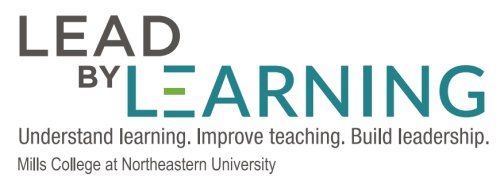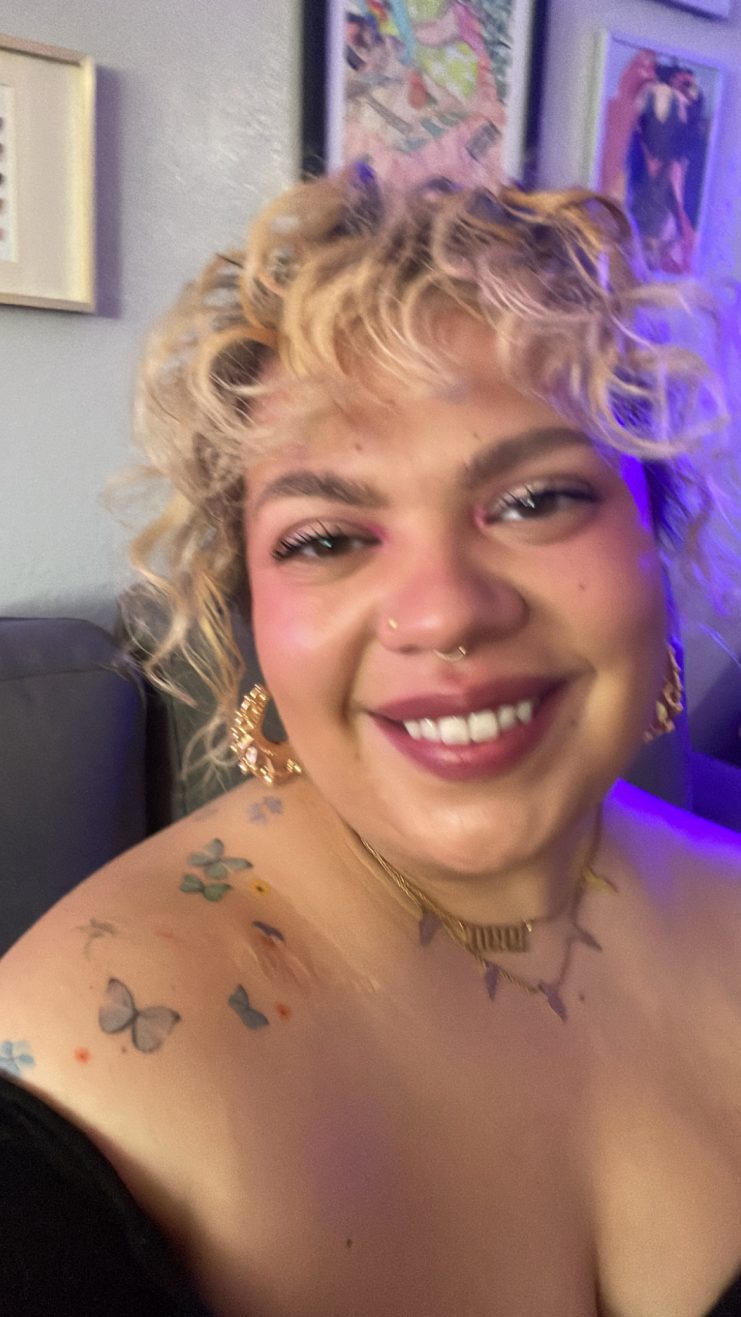
Data Can Be Anything!
This school year, I learned something even *more* valuable than excellent organizational skills or awe-inspiring unit plans. This year I learned something new about data.
Up until the 2021-22 school year, I had been teaching 8th grade science for 4.5 years in San Diego at the same site. However, the last few years caused a significant amount of upheaval, and I’m currently a 7th grade math and science teacher at Sojourner Truth, the distance learning academy in Oakland Unified. While others returned to in person instruction, I continued to teach my students virtually.
I decided to join the OUSD ELLMA Lead by Learning inquiry group to specifically support me and support my Long Term English Learner students. At each session we were asked to bring in data to help us understand what our students were learning. All around me teachers were bringing in notebooks, worksheets, and recording their students in class. They all taught at “traditional schools.” But I felt stuck, what data could I gather while teaching virtually?
An epiphany came through at one of our Lead by Learning sessions, thanks to all of the amazing collaborative and deeply introspective work I was able to do in our meetings this year. In a small group during our Public Learning triads I raised my struggle with collecting data. And my colleagues supported me and then the “ah-ha” happened.
It finally struck me that data can be anything, and that by manipulating the questions that *I* ask, I can gather different sets of data from the same tasks.
It sounds so simple, but finally being able to intellectualize “you can gather data during any activity and at any time, you just need to pick your question” was a total game changer. I wouldn’t have (and hadn’t) gotten there on my own–it took the conversations, the Supportive Challenge, I had with my fellow educators in the group as well as the specific activities and conversations that had been set up for us by OUSD ELLMA and Lead by Learning.
For me, I think my “block” with data calls back to other insecurities I’ve always had as an educator– my feeling of not being organized enough. All of that energy that I spent on trying to force myself into this type-a super-teacher was actually taking away from the energy I could have already been spending on analyzing the data I was already gathering my way.
So, I needed data? I was already getting it! I just needed to trust myself and figure out how to read what I had in front of me.
Well, part of teaching is checking in to see if our students are getting it, right? And by “getting it” we mean, intellectualization, finding patterns, applications, recognition, adaptation, right? We mean we want to see our students not just following along, but applying knowledge, even if it has to be changed a little bit first to do so. And how are we to gather the data that lets us know if they are successful or not? Well, that’s the tough part, right? Because it’s not as simple as giving students a test, even though we want it to be.
First, we have to know the following:
- How do I ask the right questions?
- What does this assessment tell me?
- What am I trying to figure out?
- What have I learned as the educator?
- What do I need to change to get the data I actually want and need to understand their learning?
It’s not that simple, because ultimately it’s not about how organized you can be or about how many graphic organizers you can show off. It’s about understanding as the educator that your students will provide you with different information depending upon what you ask of them. Meaning, the *questions* have to be perfect, not the worksheet. Specifically, if I want to gather data on student conversation, I need to ask a question that requires my students to have a discussion. It wouldn’t make sense, then, to ask them to write things down. Not unless I want to gather data about their writing ability. Again, simple, right? Yes–but only when we recognize that it is *our questioning as the educator* that makes the difference between confusing not only ourselves, but our students as well.
Once I had this big “ah-ha” I began to make changes to my practice. Below is an “assessment” I had my students do in the fall.
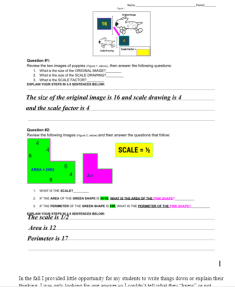
In the fall I provided little opportunity for my students to write things down or explain their thinking. I was only looking for one answer so I couldn’t tell what they “knew” or not.
Through the support of Lead by Learning and my colleagues pushing my thinking, my assessments began to change in the spring. Now I could support my English Learners more too because I was asking for them to actually produce original language.
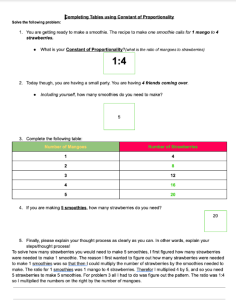
Just visually, you can see there was a better opportunity for students to write down their thinking and explain their process of completing the problem. Because of the Lead by Learning session, I was not only able to intellectualize the importance of asking the right questions, but I was able to create much better worksheets and gather much clearer data about my students’ abilities to not only solve the problems, but express their thinking and share their thought process in a clear and enlightening way.
Not only do I see improvement in regards to mathematical skills, my students clearly understand ratios and proportions better over time, but I also see a lot more of their thought process overall. Because I paid more attention to the questions with the goal of gathering data than the appearance of my worksheet being perfect, my students understood more and I understood their thinking. No longer did I just ask my students to show me that they can copy or repeat, now I was asking them to explain how they did the math, whether it was right or wrong. I realized I wanted my students to tell me whether they felt confident or not; I wanted a peek into their brains; I wanted to be able to understand where they had deficits so I could help them improve. By realizing that my students’ thinking was my data, I could ask the right questions and support my students better than any perfect unit plan or classroom organizational strategy ever could.
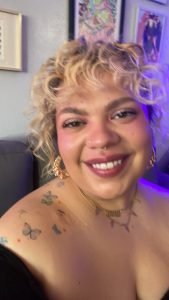 Carmela Golden-Reyna is a STEM educator at Sojourner Truth Distance Learning Academy in OUSD. Born and raised in California, Carmela splits her time between The Bay Area and San Diego, where she is currently living. Earning degrees in San Diego and Scotland, Carmela has a Bachelor’s degree in Religious Studies and a Teaching Credential in Foundational Sciences from San Diego State University, also earning a Master’s degree in Social Anthropology from The University of Edinburgh. Currently teaching seventh grade math and science online, Carmela is proud of her ability to adapt to her students’ needs, regardless of the challenge. Now in her 7th year as a credentialed teacher, Carmela began working in education even before graduating high school herself, working with disabled students at a local community college and tutoring high schoolers before entering the classroom full time. Carmela loves to find a warm spot in the sun where she can snack, nap and read, much like her two cats, Misu and Kuchi Kopi.
Carmela Golden-Reyna is a STEM educator at Sojourner Truth Distance Learning Academy in OUSD. Born and raised in California, Carmela splits her time between The Bay Area and San Diego, where she is currently living. Earning degrees in San Diego and Scotland, Carmela has a Bachelor’s degree in Religious Studies and a Teaching Credential in Foundational Sciences from San Diego State University, also earning a Master’s degree in Social Anthropology from The University of Edinburgh. Currently teaching seventh grade math and science online, Carmela is proud of her ability to adapt to her students’ needs, regardless of the challenge. Now in her 7th year as a credentialed teacher, Carmela began working in education even before graduating high school herself, working with disabled students at a local community college and tutoring high schoolers before entering the classroom full time. Carmela loves to find a warm spot in the sun where she can snack, nap and read, much like her two cats, Misu and Kuchi Kopi.
